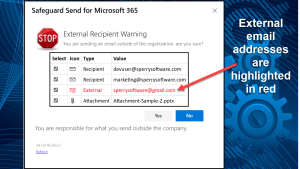How Safeguard Send Could Have Prevented a DHS Email Mishap
In January 2025, a Department of Homeland Security (DHS) staffer faced severe consequences after accidentally including a journalist in an email chain about an upcoming Immigration and Customs Enforcement (ICE) operation in Denver. Though the email contained unclassified information, it included sensitive law enforcement details, such as the timing of the operation and potential target locations. This mistake led to the employee being placed on administrative leave and facing the revocation of her security clearance, jeopardizing her career in homeland security.
The Incident: A Costly Oversight
 The DHS employee reportedly added a journalist from a conservative news outlet to an internal email by mistake. Upon realizing the error, she contacted the journalist, who agreed to keep the information confidential. Despite this, another recipient on the email chain reported the incident to DHS leadership. The subsequent fallout included mandatory polygraph tests, demands for personal phone access (which the employee declined), and an investigation that concluded with her security clearance being revoked.
The DHS employee reportedly added a journalist from a conservative news outlet to an internal email by mistake. Upon realizing the error, she contacted the journalist, who agreed to keep the information confidential. Despite this, another recipient on the email chain reported the incident to DHS leadership. The subsequent fallout included mandatory polygraph tests, demands for personal phone access (which the employee declined), and an investigation that concluded with her security clearance being revoked.
While the ICE operation was not compromised and proceeded without issue, this incident underscores how even unclassified but sensitive information can have significant ramifications when shared with unintended recipients. The mistake not only disrupted the employee’s career but also highlighted vulnerabilities in email communication protocols within high-stakes environments like DHS.
How Safeguard Send for Microsoft 365 Could Have Helped
This incident is a textbook example of how Safeguard Send for Microsoft 365 (SS365) could have prevented such an error. SS365 is designed to help organizations avoid accidental email mistakes by implementing advanced safeguards before emails are sent.
Here’s how SS365 could have mitigated this situation:
- Recipient Confirmation: SS365 prompts users to confirm external recipients before sending an email. In this case, the software would have flagged the journalist’s email address as external and required explicit confirmation before proceeding.
- Domain Checking: The add-in can be configured to warn or block emails sent to domains outside of approved lists. This feature would have alerted the DHS staffer that she was emailing someone outside of her organization.
- Keyword Detection: SS365 can scan emails for sensitive keywords or phrases (e.g., “ICE operation,” “Denver targets”) and trigger additional warnings or require managerial approval before sending.
- Review Period: The “delayed send” feature allows users to recall or cancel emails within a specified time window after hitting send, giving them a chance to catch mistakes.
This incident is not an isolated case; similar mistakes happen across industries daily, often with serious consequences. Whether it’s leaking sensitive operational details or accidentally sharing confidential client information, these errors can lead to reputational damage, legal liabilities, and financial losses.
In high-stakes environments like government agencies or corporations handling sensitive data, tools like Safeguard Send are indispensable for mitigating human error. By implementing proactive safeguards, organizations can protect their employees and ensure that sensitive information remains secure.
Conclusion
The DHS email mishap serves as a cautionary tale about the risks of accidental disclosures in professional communication. With tools like Safeguard Send for Microsoft 365, such mistakes are preventable. By integrating robust email safeguards into their workflow, organizations can avoid costly errors while fostering a culture of accountability and security.
For more information about how Safeguard Send can protect your organization from similar incidents, visit our website or contact us today!
